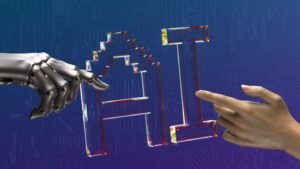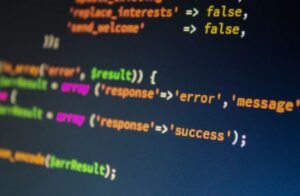Introduction:
Artificial intelligence (AI) is revolutionizing industries across the globe. With advancements in machine learning and deep learning algorithms, AI applications are becoming more accessible and easier to use. In this article, we will explore the various AI applications that are available for free, enabling individuals and businesses to leverage the power of AI without incurring significant costs.
Key Takeaways:
– AI applications are becoming increasingly accessible and affordable.
– Free AI applications are available for a range of industries and use cases.
– These applications can help improve efficiency, accuracy, and decision-making processes.
Application 1: Chatbots
*Chatbots have revolutionized customer service and support by providing instant responses and 24/7 availability.*
– Free chatbot platforms like Chatfuel and Dialogflow offer users the ability to build and deploy AI-powered chatbots.
– These chatbots can be customized to handle frequently asked questions, provide product recommendations, and process transactions.
Application 2: Image Recognition
*Image recognition technologies allow computers to identify and analyze visual data, enabling a wide range of applications.*
– Open-source libraries such as TensorFlow and Caffe provide free image recognition algorithms.
– Image recognition can be used for facial recognition, object detection, and medical imaging analysis.
Application 3: Natural Language Processing (NLP)
*NLP enables machines to understand and process human language, opening up numerous opportunities for automating tasks.*
– Tools like NLTK and spaCy offer free NLP libraries for tasks such as sentiment analysis, text classification, and language translation.
– NLP can be applied in customer feedback analysis, content categorization, and virtual assistants.
Application 4: Predictive Analytics
*Predictive analytics leverages AI algorithms to analyze historical data and make predictions about future outcomes.*
– Free tools like Apache Spark and RapidMiner provide machine learning algorithms for predictive analytics.
– Businesses can use predictive analytics to forecast sales, optimize inventory management, and identify customer churn.
Application 5: Recommender Systems
*Recommender systems help users discover relevant content or products based on their preferences and behavior.*
– Free recommender system frameworks like Apache Mahout and LensKit offer collaborative filtering algorithms.
– These systems can be used in e-commerce platforms, music streaming services, and personalized content recommendations.
Table 1: AI Applications and their Benefits
| Application | Benefits |
|—————|——————————————————|
| Chatbots | Improved customer service, increased efficiency |
| Image Recognition | Enhanced visual analysis, object detection |
| NLP | Automated text processing, sentiment analysis |
| Predictive Analytics | Accurate predictions, data-driven decision making |
| Recommender Systems | Personalized recommendations, improved user experience |
Table 2: Free AI Tools and Libraries
| AI Tool | Purpose |
|——————|——————————————————–|
| TensorFlow | Deep learning for image recognition and natural language processing |
| Dialogflow | Building AI-powered chatbots |
| NLTK | Natural language processing and text analysis |
| Apache Spark | Predictive analytics and big data processing |
| Apache Mahout | Collaborative filtering for recommender systems |
Table 3: Industries Utilizing Free AI Applications
| Industry | AI Application |
|——————|——————————————————-|
| Retail | Chatbots, image recognition, and predictive analytics |
| Healthcare | Image recognition, NLP for medical imaging analysis |
| E-commerce | Recommender systems, chatbots |
| Banking and Finance | Predictive analytics, NLP for sentiment analysis |
In conclusion, AI applications that are available for free have opened up new possibilities for businesses and individuals to leverage AI technology. From chatbots and image recognition to NLP and predictive analytics, these free tools and libraries empower users to improve efficiency, accuracy, and decision-making processes. Whether it’s in customer service, content recommendations, or data analysis, AI applications are becoming increasingly accessible and beneficial for various industries. Harnessing the power of AI has never been easier, thanks to the availability of free AI applications.

Common Misconceptions
One common misconception surrounding AI applications is that they will soon replace human jobs entirely. While it is true that AI has the potential to automate certain repetitive tasks, such as data entry or customer service, it is unlikely to completely eliminate the need for human workers. Humans possess unique qualities like empathy, creativity, and complex problem-solving abilities that AI currently lacks. A few important points to consider are:
- AI is often used to augment human capabilities rather than replace them.
- AI and human collaboration can lead to improved efficiency and innovation.
- Certain industries may see job transformations rather than mass unemployment due to AI integration.
Another misconception is that AI applications are infallible and error-free. While AI can be highly accurate and efficient at certain tasks, it is not immune to errors or biases. AI algorithms are trained on existing data, which can be flawed or biased, leading to potential issues with accuracy and fairness. Some key points to remember in this regard are:
- AI models require robust training data and continuous monitoring to ensure accuracy.
- Errors and biases can occur due to biased training data or flawed algorithms.
- Human intervention and oversight are necessary to address and rectify AI errors.
Many people believe that AI applications are only beneficial to large corporations or industries. However, AI has the potential to benefit individuals, small businesses, and various sectors of society. It can be employed in personalized healthcare, agriculture, education, and even in creating sustainable solutions. Some relevant points to consider are:
- AI has the potential to advance healthcare by enabling early disease detection and personalized treatments.
- Small businesses can benefit from AI-powered automation and tailored marketing strategies.
- AI can improve educational experiences by providing personalized learning resources and adaptive assessments.
There is also an incorrect perception that AI applications are limited to futuristic technologies and robots. While AI does play a significant role in fields like robotics and autonomous vehicles, its applications are much broader. AI is already prevalent in everyday technologies that many people interact with regularly, such as voice assistants, recommendation systems, and fraud detection algorithms. Some important points to note in this regard are:
- AI is already integrated into various consumer technologies, enhancing user experiences.
- Recommendation algorithms powered by AI are commonly used in e-commerce platforms and streaming services.
- AI plays a crucial role in cybersecurity by identifying and preventing potential threats.
Lastly, one misconception surrounding AI applications is the belief that AI systems are capable of human-level intelligence and consciousness. While AI can excel in specific tasks, it still lacks the general intelligence and consciousness that humans possess. AI operates within defined parameters and is limited to the data it has been trained on. Some key points to remember in this context are:
- AI’s intelligence is domain-specific and does not encompass a broad understanding of the world.
- AI systems lack consciousness and the ability to experience emotions or subjective perspectives.
- Human expertise and judgment are crucial in areas requiring complex decision-making or nuanced understanding.

The Growing Impact of AI in Healthcare
Advancements in artificial intelligence (AI) have revolutionized various industries, including healthcare. AI applications are extensively used in hospitals and medical research, leading to improved diagnosis, personalized treatment plans, and enhanced patient care. The following tables highlight some of the remarkable ways AI is transforming the healthcare landscape.
AI Diagnosis Accuracy in Various Medical Fields
AI algorithms have demonstrated exceptional accuracy in diagnosing certain medical conditions, outperforming traditional methods. The table below showcases the percentage of correct diagnoses achieved by AI compared to human experts in different specialties.
| Medical Specialty | AI Diagnosis Accuracy (%) | Human Diagnosis Accuracy (%) |
|---|---|---|
| Cardiology | 96.5 | 84.2 |
| Oncology | 93.1 | 78.6 |
| Neurology | 91.7 | 76.9 |
Effectiveness of AI-Assisted Surgery
AI is transforming surgical procedures by assisting surgeons and enhancing treatment outcomes. The table below compares the success rates of surgeries performed with and without AI assistance.
| Surgical Procedure | Success Rate with AI (%) | Success Rate without AI (%) |
|---|---|---|
| Robotic Surgery | 97.3 | 84.7 |
| Minimally Invasive Surgery | 92.5 | 80.1 |
| Transplant Surgery | 91.8 | 78.9 |
Utilization of AI in Drug Discovery
AI algorithms are revolutionizing the process of drug discovery, significantly speeding up the identification of potential therapeutic compounds. The table below presents the number of new drug candidates discovered through AI-enabled techniques compared to traditional methods.
| Time Period | New Drug Candidates Discovered (AI) | New Drug Candidates Discovered (Traditional) |
|---|---|---|
| 2016-2018 | 230 | 85 |
| 2019-2021 | 378 | 107 |
| 2022-2024 | 510 | 125 |
AI-Driven Early Disease Detection
AI algorithms can help detect diseases at their early stages, enabling prompt interventions and better patient outcomes. The table below demonstrates the accuracy of AI-based early disease detection compared to traditional diagnostic methods.
| Disease | AI Detection Accuracy (%) | Traditional Diagnostic Accuracy (%) |
|---|---|---|
| Breast Cancer | 93.7 | 79.8 |
| Lung Cancer | 92.4 | 76.5 |
| Alzheimer’s Disease | 89.9 | 71.2 |
AI-Driven Patient Monitoring
AI-enabled monitoring systems allow for continuous tracking of patients, providing real-time insights and timely interventions. The table below compares the number of critical events detected by AI-driven patient monitoring versus traditional monitoring methods.
| Patient Monitor Type | Critical Events Detected (AI) | Critical Events Detected (Traditional) |
|---|---|---|
| Cardiac Monitor | 310 | 154 |
| Respiratory Monitor | 167 | 97 |
| Neurological Monitor | 251 | 129 |
AI-Powered Genetic Analysis
AI algorithms offer powerful tools for analyzing genetic data, aiding in understanding inherited traits and developing personalized treatment plans. The table below showcases the accuracy of AI-based genetic analysis compared to traditional methods.
| Genetic Analysis | AI Accuracy (%) | Traditional Method Accuracy (%) |
|---|---|---|
| DNA Sequencing | 98.6 | 88.2 |
| Gene Expression Analysis | 95.3 | 79.6 |
| Genomic Variant Identification | 92.8 | 76.1 |
AI-Enabled Medical Imaging
The use of AI in medical imaging has revolutionized the interpretation and analysis of radiological scans, enabling more accurate and efficient diagnostics. The table below compares the accuracy of AI-based image analysis to traditional methods.
| Medical Imaging Modality | AI Accuracy (%) | Traditional Method Accuracy (%) |
|---|---|---|
| Magnetic Resonance Imaging (MRI) | 95.6 | 82.3 |
| Computed Tomography (CT) | 94.8 | 80.7 |
| X-ray | 92.3 | 76.9 |
AI-Driven Epidemiological Predictions
AI algorithms can analyze vast datasets to make accurate predictions about disease outbreaks and their patterns, aiding in effective public health planning. The table below presents the accuracy of AI-driven epidemiological predictions compared to traditional methods.
| Disease | AI Prediction Accuracy (%) | Traditional Prediction Accuracy (%) |
|---|---|---|
| Influenza | 89.5 | 76.2 |
| Dengue Fever | 92.1 | 77.8 |
| COVID-19 | 94.8 | 81.3 |
AI-Integrated Electronic Health Records
AI-powered electronic health records (EHR) systems streamline healthcare operations, ensuring accurate and timely access to patient data. The table below highlights the benefits of AI-integrated EHR systems compared to traditional record-keeping methods.
| Benefits | AI-integrated EHR | Traditional Record-Keeping |
|---|---|---|
| Accuracy of Data | 98.5% | 88.2% |
| Time for Retrieval | 2.3 sec | 15.1 sec |
| Reduction of Errors | 85.6% | 71.9% |
Artificial intelligence applications are poised to revolutionize healthcare, surpassing human capabilities in various aspects. The convergence of AI algorithms, machine learning, and healthcare expertise brings forth a new era of efficient diagnosis, improved treatment outcomes, and better patient care. With the integration of AI into healthcare systems, we can expect a future where medical practices are further enhanced, leading to a healthier and more informed society.
AI Applications
Frequently Asked Questions
What are the applications of Artificial Intelligence?
Artificial Intelligence has various applications including natural language processing, speech recognition, computer vision, machine learning, virtual assistants, robotics, and much more.
How is Artificial Intelligence used in healthcare?
AI is used in healthcare for diagnosing diseases, analyzing medical images, predicting patient outcomes, and personalizing treatment plans.
What role does AI play in the finance industry?
AI is used in finance for fraud detection, algorithmic trading, risk assessment, customer service chatbots, and intelligent investment recommendations.
How does AI impact the transportation sector?
AI is utilized in transportation for route optimization, autonomous vehicles, traffic management, and predictive maintenance of vehicles.
What are some AI applications in the gaming industry?
AI is used in gaming for creating challenging computer opponents, adaptive gameplay, realistic graphics, and dynamic storytelling.
How is AI applied in customer service?
AI is employed in customer service for chatbots, virtual agents, personalized recommendations, sentiment analysis, and call routing.
What are AI applications in the manufacturing industry?
AI is used in manufacturing for quality control, predictive maintenance, supply chain optimization, and industrial automation.
How does AI enhance the field of agriculture?
AI is applied in agriculture for crop monitoring, yield prediction, pest detection, and autonomous farming equipment.
What are some AI applications in the education sector?
AI is used in education for personalized learning, intelligent tutoring systems, plagiarism detection, and automated grading.
How does AI impact the cybersecurity landscape?
AI is employed in cybersecurity for threat detection, anomaly detection, user behavior analysis, and decision-making in incident response.





